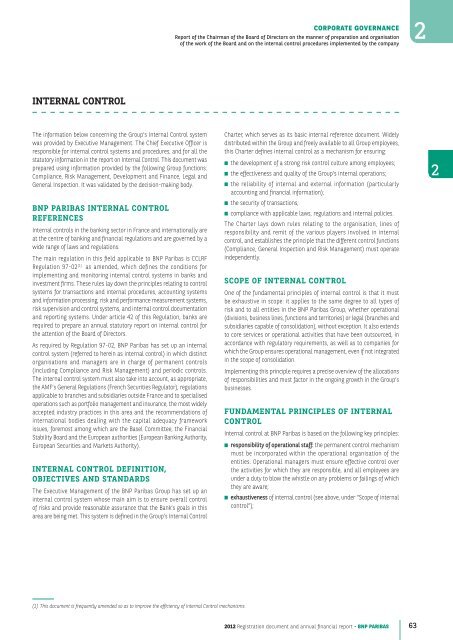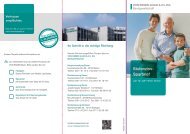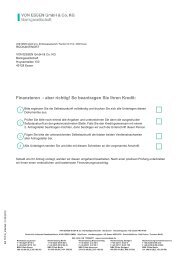2012 Registration document and annual financial report - BNP Paribas
2012 Registration document and annual financial report - BNP Paribas
2012 Registration document and annual financial report - BNP Paribas
- No tags were found...
Create successful ePaper yourself
Turn your PDF publications into a flip-book with our unique Google optimized e-Paper software.
CORPORATE GOVERNANCEReport of the Chairman of the Board of Directors on the manner of preparation <strong>and</strong> organisationof the work of the Board <strong>and</strong> on the internal control procedures implemented by the c ompany2INTERNAL C ONTROLThe information below concerning the Group’s Internal Control systemwas provided by Executive Management. The Chief Executive Officer isresponsible for internal control systems <strong>and</strong> procedures, <strong>and</strong> for all thestatutory information in the <strong>report</strong> on Internal Control. This <strong>document</strong> wasprepared using information provided by the following Group functions:Compliance, Risk Management, Development <strong>and</strong> Finance, Legal <strong>and</strong>General Inspection . It was validated by the decision-making body.<strong>BNP</strong> PARIBAS INTERNAL CONTROLREFERENCESInternal controls in the banking sector in France <strong>and</strong> internationally areat the centre of banking <strong>and</strong> <strong>financial</strong> regulations <strong>and</strong> are governed by awide range of laws <strong>and</strong> regulations.The main regulation in this field applicable to <strong>BNP</strong> <strong>Paribas</strong> is CCLRFRegulation 97-02 (1) as amended, which defines the conditions forimplementing <strong>and</strong> monitoring internal control systems in banks <strong>and</strong>investment firms. These rules lay down the principles relating to controlsystems for transactions <strong>and</strong> internal procedures, accounting systems<strong>and</strong> information processing, risk <strong>and</strong> performance measurement systems,risk supervision <strong>and</strong> control systems, <strong>and</strong> internal control <strong>document</strong>ation<strong>and</strong> <strong>report</strong>ing systems. Under article 42 of this Regulation, banks arerequired to prepare an <strong>annual</strong> statutory <strong>report</strong> on internal control forthe attention of the Board of Directors.As required by Regulation 97-02, <strong>BNP</strong> <strong>Paribas</strong> has set up an internalcontrol system (referred to herein as internal control) in which distinctorganisations <strong>and</strong> managers are in charge of permanent controls(including Compliance <strong>and</strong> Risk Management) <strong>and</strong> periodic controls.The internal control system must also take into account, as appropriate,the AMF’s General Regulations (French Securities Regulator), regulationsapplicable to branches <strong>and</strong> subsidiaries outside France <strong>and</strong> to specialisedoperations such as portfolio management <strong>and</strong> insurance, the most widelyaccepted industry practices in this area <strong>and</strong> the recommendations ofinternational bodies dealing with the capital adequacy frameworkissues, foremost among which are the Basel Committee, the FinancialStability Board <strong>and</strong> the European authorities (European Banking Authority,European Securities <strong>and</strong> Markets Authority).INTERNAL CONTROL DEFINITION,OBJECTIVES AND STANDARDSThe Executive Management of the <strong>BNP</strong> <strong>Paribas</strong> Group has set up ani nternal c ontrol system whose main aim is to ensure overall controlof risks <strong>and</strong> provide reasonable assurance that the Bank’s goals in thisarea are being met. This system is defined in the Group’s Internal ControlCharter, which serves as its basic internal reference <strong>document</strong>. Widelydistributed within the Group <strong>and</strong> freely available to all Group employees,this Charter defines internal control as a mechanism for ensuring:■ the development of a strong risk control culture among employees;■ the effectiveness <strong>and</strong> quality of the Group’s internal operations;■ the reliability of internal <strong>and</strong> external information (particularlyaccounting <strong>and</strong> <strong>financial</strong> information);■ the security of transactions;■ compliance with applicable laws, regulations <strong>and</strong> internal policies.The Charter lays down rules relating to the organisation, lines ofresponsibility <strong>and</strong> remit of the various players involved in i nternalc ontrol, <strong>and</strong> establishes the principle that the different control functions(Compliance, General Inspection <strong>and</strong> Risk Management) must operateindependently.SCOPE OF INTERNAL CONTROLOne of the fundamental principles of i nternal c ontrol is that it mustbe exhaustive in scope: it applies to the same degree to all types ofrisk <strong>and</strong> to all entities in the <strong>BNP</strong> <strong>Paribas</strong> Group, whether operational(divisions, business lines, functions <strong>and</strong> territories) or legal (branches <strong>and</strong>subsidiaries capable of consolidation), without exception. It also extendsto core services or operational activities that have been outsourced, inaccordance with regulatory requirements, as well as to companies forwhich the Group ensures operational management, even if not integratedin the scope of consolidation.Implementing this principle requires a precise overview of the allocationsof responsibilities <strong>and</strong> must factor in the ongoing growth in the Group’sbusinesses.FUNDAMENTAL PRINCIPLES OF INTERNALCONTROLInternal control at <strong>BNP</strong> <strong>Paribas</strong> is based on the following key principles:■ responsibility of operational staff: the permanent control mechanismmust be incorporated within the operational organisation of theentities. Operational managers must ensure effective control overthe activities for which they are responsible, <strong>and</strong> all employees areunder a duty to blow the whistle on any problems or failings of whichthey are aware;■ exhaustiveness of internal control (see above, under “Scope of i nternalc ontrol”);2(1) This <strong>document</strong> is frequently amended so as to improve the efficiency of Internal Control mechanisms.<strong>2012</strong> <strong>Registration</strong> <strong>document</strong> <strong>and</strong> <strong>annual</strong> <strong>financial</strong> <strong>report</strong> - <strong>BNP</strong> PARIBAS 63





